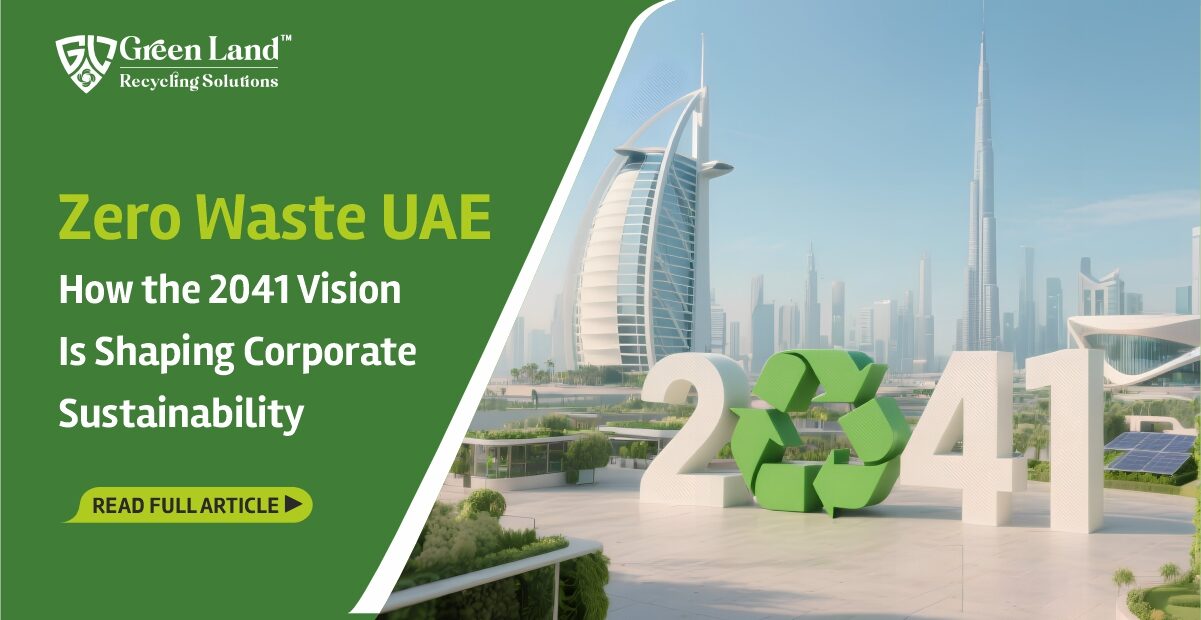
The UAE has set a bold target: minimizing waste, diverting materials from landfills, and embedding circular economy principles across business, industry and households. Under the Dubai Integrated Waste Management Strategy 2021–2041 the goal is to achieve zero landfill waste in Dubai by 2041. Similar ambitions are embedded across the Emirates, including a “zero waste” framework in Abu Dhabi.
For businesses, this isn’t a distant public-policy discussion—it’s a practical, strategic call to action.
What the 2041 Vision Means for Businesses & Households
1. From Disposal to Diversion
The shift away from landfills means companies must move from “dispose and forget” to “segregate, recycle, recover.” Waste streams like plastics, textiles, food and e-waste become assets, not burdens.
2. Compliance Becomes Strategic Opportunity
As the UAE ramps up regulation, reporting and certifications tied to waste will matter more. Businesses that lead now gain operational advantage, reputational benefit and risk mitigation.
3. Household & Corporate Alignment
The zero-waste goal isn’t only for municipalities. Households, offices, factories and retail all carry responsibility. Source-segregation, reuse and recycling habits at office and home reinforce each other in the circle of sustainability.
4. Waste as Resource, Not Burden
Industrial by-products, packaging, manufacturing rejects and even food-waste become inputs for a circular system—recovering value, reducing raw-material demand, and aligning with the national vision.
How Green Land Recycling Contributes
At Green Land Recycling, we partner with UAE corporations, factories, hotels and retailers to turn the zero-waste vision into everyday reality:
- We manage industrial and commercial waste streams—textiles, plastics, e-waste, food/organic, specialized waste—reducing landfill reliance.
- We provide certified recycling and treatment, giving businesses traceable outcomes for ESG and sustainability reporting.
- Through our advanced processing and up-cycling methods, we ensure materials are recovered, repurposed and re-enter the economy—not trashed.
- We help organizations embed systems (segregation, reuse, reporting) so zero-waste isn’t a one-time audit, but a continual business practice.
What You Can Do Right Now
- Audit your waste streams: Identify what you generate, what you discard, and what you could recover.
- Partner with certified recyclers: Choose service providers who deliver traceable results, not just collection.
- Integrate circular-economy thinking: View waste as a resource; redesign packaging, materials & processes accordingly.
- Educate & engage: From employees to suppliers and customers, build awareness of zero-waste practices.
- Monitor & report: Use the data produced by recycling partners to feed into your ESG or sustainability reporting frameworks.
Final Thought
The UAE’s 2041 zero-waste ambition is more than a benchmark. It’s a roadmap for change, a business opportunity and a sustainability imperative. For companies ready to lead, the moment is now. With Greenland Recycling as your partner, you can move beyond compliance and into value-creating, resource-recovering sustainability.


